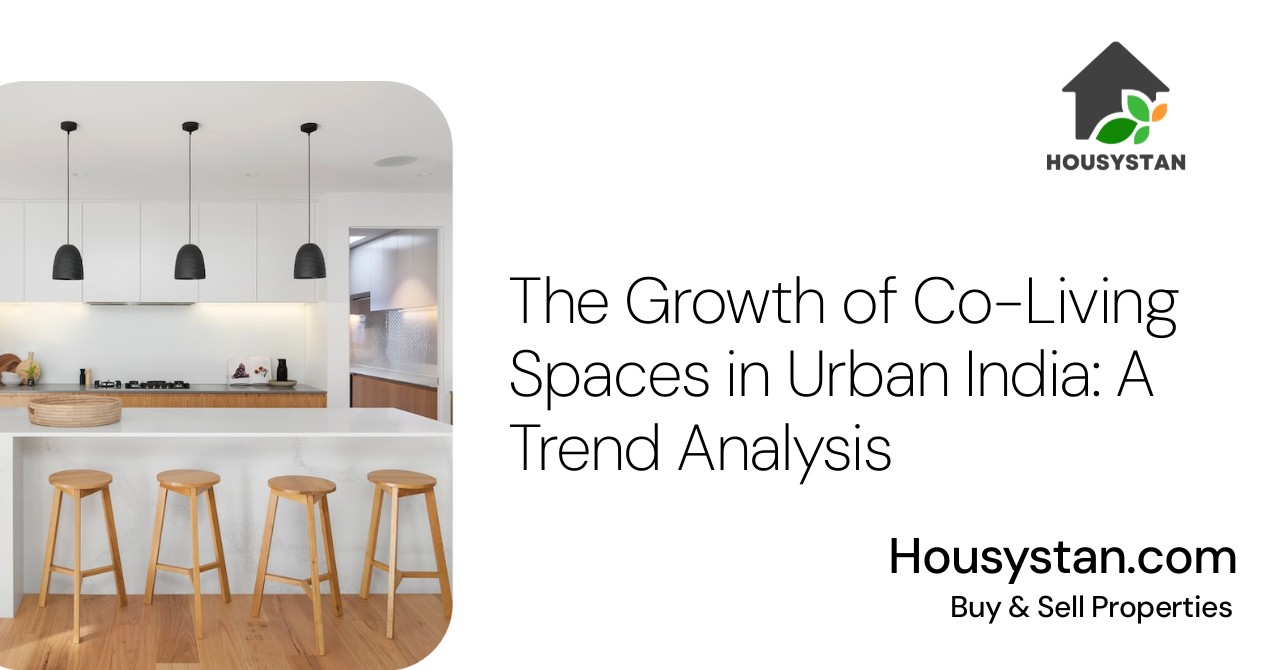The Growth of Co-Living Spaces in Urban India: A Trend Analysis
Read latest blogs and articles from Housystan

The Information mentioned here was last updated on:
21/2/2026The Growth of Co-Living Spaces in Urban India: A Trend Analysis
Introduction: Changing Urban Living Landscapes
In the last decade, urban India has witnessed a dramatic transformation in the way people live, work, and interact with their surroundings. The concept of co-living spaces has taken center stage in metropolitan cities such as Mumbai, Bangalore, Delhi, and Hyderabad. Driven by the influx of young professionals, students, and digital nomads, co-living arrangements are redefining the traditional notion of rental accommodation. This article delves into the core factors behind the surge in co-living spaces, analyzes the evolving demand, and explores what the future might hold for this innovative housing trend.
- Verified Tenants/Buyers
- Unlimited Property Listing
- Zero subscription/charges fee
The Rise of Co-Living Spaces: A Brief Overview
Co-living spaces, essentially shared housing designed for convenience, affordability, and community, have emerged as a popular alternative to conventional rentals. Unlike traditional apartments, co-living properties offer fully furnished rooms, common recreational areas, and flexible leasing options. Managed by professional operators, these spaces often come with amenities like housekeeping, Wi-Fi, laundry, and even community events, making them highly attractive to urban dwellers seeking hassle-free living.
Demographic Shifts Fueling Co-Living
One of the primary drivers behind the growth of co-living in India is the demographic shift towards a younger, mobile, and career-focused population. With millions of students migrating to urban centers for higher education and fresh graduates pursuing lucrative job opportunities, there is a constant demand for affordable, well-connected housing. The rise of start-up culture and the gig economy has further encouraged young professionals to seek flexible living arrangements, often for shorter durations. Co-living spaces effectively address these needs, offering both affordability and a sense of belonging in a new city.
Urbanization and Housing Affordability
India’s rapid urbanization has brought with it an acute shortage of affordable housing, especially in major metropolitan areas. Traditional rental agreements, often laden with rigid clauses and high security deposits, can be a deterrent for many. Co-living operators have stepped into this gap, offering transparent pricing models, minimal deposits, and even all-inclusive rents that cover utilities and maintenance. This has made co-living a financially sensible option, particularly for those just starting their professional journeys.
Technology as an Enabler
The seamless integration of technology has played a significant role in the proliferation of co-living spaces. From virtual tours and online bookings to mobile apps that manage rent payments and maintenance requests, technology has streamlined the entire resident experience. Smart home features, biometric access, and high-speed internet are now considered standard offerings, catering to the tech-savvy millennial and Gen Z population.
Community and Social Connectivity
Beyond just a roof over one’s head, co-living spaces promise a unique sense of community. In a world where urban loneliness is on the rise, these properties foster social interactions through shared kitchens, lounges, game rooms, and curated events. Many operators organize workshops, networking sessions, and wellness activities, helping residents form lasting friendships and professional connections. This emphasis on community living is a major draw for newcomers seeking both support and companionship.
Professional Management and Safety
Unlike the fragmented and often unregulated owner-driven rental market, co-living spaces are typically run by professional property management firms. These operators ensure regular maintenance, prompt grievance redressal, and robust security measures. For women, students, and working professionals, safety is a top priority, and the presence of CCTV surveillance, 24/7 security, and secure access control adds to the appeal of co-living arrangements.
Investment and Real Estate Trends
The co-living sector has also caught the attention of real estate investors and developers. With high occupancy rates and steady rental yields, co-living properties present a lucrative opportunity. Several large players have entered the market, attracting significant venture capital funding. Developers are now collaborating with co-living operators to convert underutilized properties or build new, purpose-designed complexes to meet the evolving needs of urban dwellers.
Challenges Facing the Co-Living Sector
Despite its rapid growth, the co-living industry faces several challenges. Regulatory ambiguities, zoning restrictions, and the absence of a clear legal framework can hinder expansion. Additionally, maintaining consistent quality across different properties and ensuring a positive resident experience remain ongoing concerns. Operators must also adapt to changing market dynamics, such as fluctuating demand during the COVID-19 pandemic, which highlighted the need for stringent hygiene protocols and flexible rental terms.
The Pandemic Effect: Resilience and Adaptation
The COVID-19 pandemic initially posed significant challenges to the co-living sector, with many residents opting to return to their hometowns or seek less crowded accommodations. However, the industry has shown remarkable resilience. Many operators introduced contactless check-ins, enhanced cleaning protocols, and flexible lease options to reassure residents. As remote work became the norm, co-living spaces adapted by offering dedicated work-from-home zones and high-speed internet, catering to the evolving lifestyle of urban professionals.
The Road Ahead: Future Prospects
Looking ahead, the co-living trend in urban India shows no signs of slowing down. As cities continue to expand and more young people migrate for education and employment, the demand for affordable, flexible, and community-driven housing will only grow. Innovations such as theme-based co-living, senior citizen co-living, and luxury co-living are already emerging, catering to diverse segments of the population. Sustainability is also gaining prominence, with many operators incorporating green building practices and energy-efficient solutions.
Conclusion: A New Era of Urban Living
Co-living spaces are not just a passing fad—they represent a fundamental shift in the way urban Indians approach housing. By combining affordability, convenience, technology, and a strong sense of community, co-living addresses the unique challenges of modern city life. As the sector matures and regulations evolve, co-living is poised to become an integral part of the urban housing landscape, offering a glimpse into the future of shared living in India’s bustling metropolises.